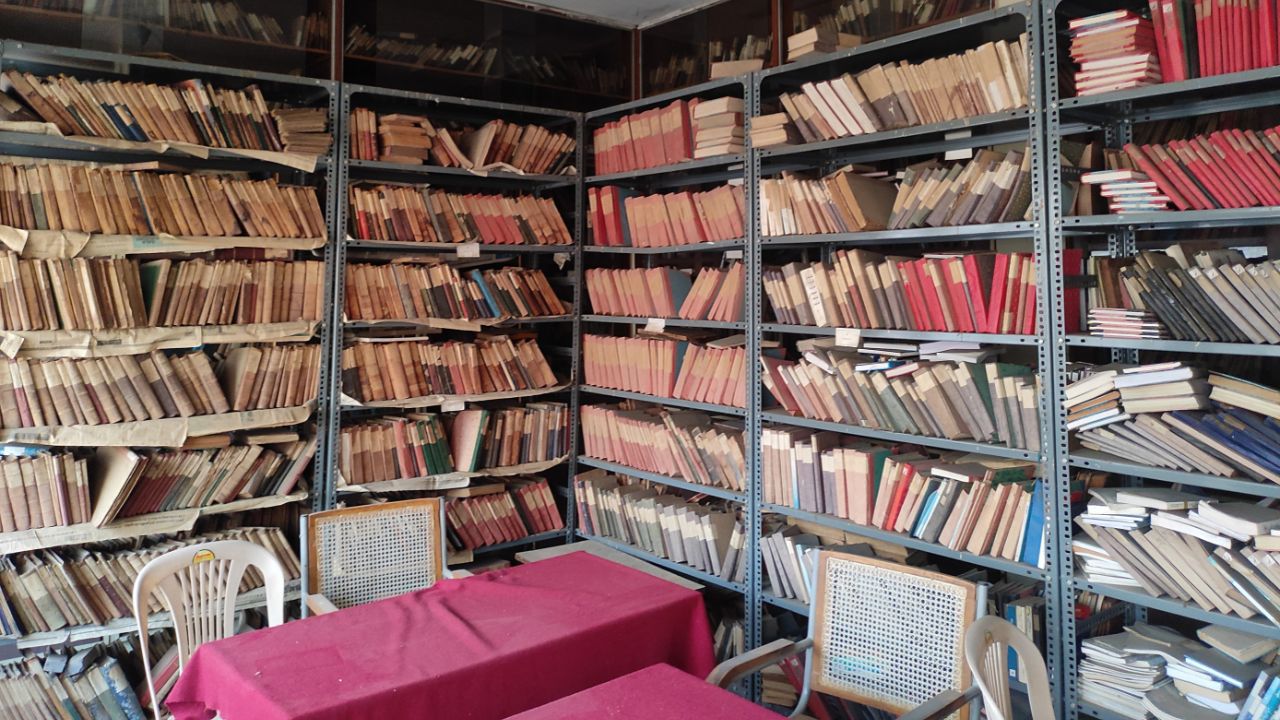A hundred-year-old Muslim library stands firm in the narrow lanes of Shivajinagar, Bangalore, barely visible from the outside and quite difficult to locate. By asking the locals, one can find a small staircase squeezed between shops leading to the library. You can easily detect the smell of old books on the staircase, and upon entering the library, a sudden sense of calm and peace permeates the bustling market. There have been many highs and lows throughout the library’s long and illustrious history, and in 2014, it celebrated its centenary.
At the beginning of the second decade of the 20th century, a group of intellectuals and benefactors in the city of Bangalore came together to promote the Urdu language and raise educational awareness among Muslims. On 5th May 1912, Bangalore’s Muslim Library was founded. The inaugural conference took place at Maulvi Abdul Ghaffar Sahab’s New Market Road (Char Minar Road) building on 9th May 1912. Five months after its establishment, in 1912, the library moved from the New Market Road building to a shop on Masjid Street, where Madarasa Quwwatul Islam was located.
In January 1929, a significant event took place when Amin-ul Malik Mirza Muhammad Ismail Diwan of the Mysore State presided over a grand meeting at the Globe Theatre (Opera Bazaar) in honour of the poet of the east – Allama Dr Muhammad Iqbal. During this meeting, Allama Iqbal was presented with a letter of appreciation by the library. The library members raised money for Allama Iqbal’s visit and the meeting under the name “Iqbal Fund.” Additionally, the library celebrated its founding anniversary on 9th May 1937, with a grand celebration presided over by Baba Urdu Maulvi Abdul Haq, the Secretary of Anjuman Tarqee Urdu.
The Muslim Library was registered under Registration Act 21-1860 on 3rd May 1935, at the Bangalore office of Joint Stock Companies. To ensure the security and maintenance of the library’s assets, a trust named “Muslim Library Trust, Bangalore” was established and registered under the Indian Registration Act 1-1908 in the office of the Sub-Registrar, Civil Station, Bangalore, on 14th September 1957. Donations were received, and the present building of the library was purchased on 22nd May 1958, although there were concerns about the institution’s stability.
Throughout its 100-year history, many notable and famous personalities from the country and the state have visited the library and expressed their good wishes. These include Syed Sulaiman Nadvi, Allama Dr Sir Muhammad Iqbal, Maulana Shaukat Ali (Ali Brothers), Maulana Zafar Ali Khan (Director Zamindar-Lahore), Baba Urdu Maulvi Abdul Haq, Professor Abdul Wahab Bukhari, Sagar Nizami, Hazrat Josh Malihabadi, Allama Seemab Akbarabadi, Mirza Yas Yagana Chingizi, Ejaz Siddiqui, Hazrat Jigar Moradabadi, Hazrat Hafeez Jalandhri, Hazrat Amjad Hyderabadi, Maulana Mufti Muhammad Ashraf Ali, and Professor B Sheikh Ali, among others.

The two-storey library houses more than 30,000 books in various languages, though it has a treasured and rare manuscript collection in Urdu and Persian, some of which are even a century old. The library houses rare and valuable books on various subjects, ancient magazines, 1980s newspapers, and manuscripts from the Haidari era. The total number of manuscripts is 29. Some important manuscripts include: Maulvi Abdul Haq bin Saifuddin’s “Completion of Faith and Taqwaity of Faith”, “Al-Tazirat” (Dakhini Urdu), compiled by Hafiz Ahmad bin Muhammad Maghrib in 1235, “Deewan Naziri” (Fari Kalam) by Nazir Neshapuri, “Kaliat Kamal” (Urdu) by Kamal Shah Peer (Dakhini Urdu). Additionally, selected letters from Shaheed Tipu Sultan, written to various friends, are available here. The library also holds many rare books published by the famous publisher Munshi Kishore of his time. Notable among them is “Ajab al-Makhluqat,” published in 1889, and ancient and rare books on medicine such as “Talb Akbari,” Volume I, published in 1895, and the translation of “Makhzan-e-Adawiya” written by Hakeem Muhammad Noor Kareem in two volumes. Moinuddin Farooqi’s books on Islamic medicine are also available in the library.

The first person to greet visitors at the library is Muhammad Altaf, the caretaker who has been looking after the library for the past 24 years. Altaf says, “Urdu is the sweetest of all languages, though the new generation is drifting away from it. There was a time when the library used to be filled with readers. However, most of those readers are no longer alive. Only a few PhD scholars now visit the library for their work.”

A place that was previously bustling with activity from city dwellers who devoured Urdu newspapers, magazines, and novels is now desolate and silent. Amidst the haunting stillness, the sound of pages rustling from bygone eras is nearly audible. Altaf bemoaned the slow but steady decline of Urdu readers, citing youth as an example of an audience that values instant gratification more than the more reflective practice of reading, especially Urdu.
Altaf emphasised that parents should encourage their children to learn to read and write Urdu in this era. The new generation needs to pay heed to Urdu; otherwise, the language will gradually go extinct.
Altaf added, “The library is open to the public and provides a lifetime membership for Rs. 1,500. Members can issue the books; however, the older and rare collection is aesthetically stacked on the shelf. Over the years, Urdu lovers in the city have considered this place a haven for learning.”
The Muslim Library is one of the repositories of India’s linguistic and cultural wealth, holding the key to Urdu’s revival. By digitising their precious collections, these forgotten sanctuaries can be transformed into accessible digital archives. Coupled with restoration efforts, proper funding, and community engagement through reading clubs, literary events, and language courses, these libraries can become vibrant hubs of learning and appreciation. Strategic partnerships with the government, corporations, and the public are essential to ensuring their preservation and expansion. With a concerted effort, these libraries can ignite a renaissance of Urdu, reasserting its place as the soul of India’s literary heritage.
Related
Nabeel Ahmad is an independent researcher and a library professional based in New Delhi.









































